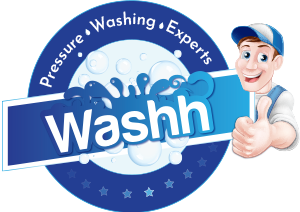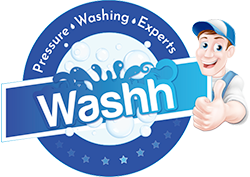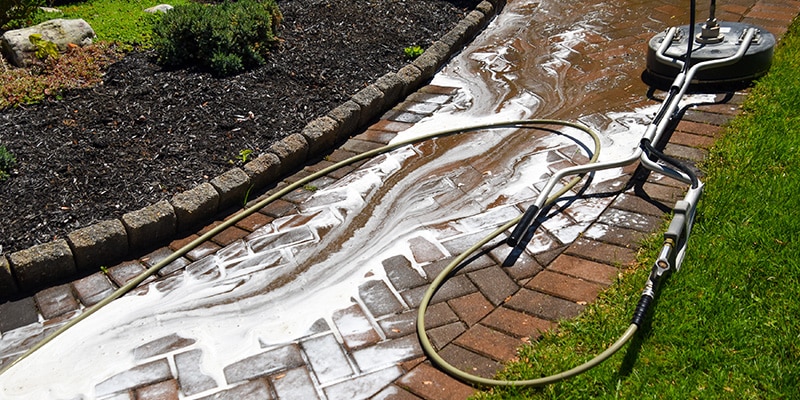Although the force of the water from a pressure washer can sometimes be enough to clean a surface, the use of cleaning solutions such as soaps, detergents, and chemicals is often necessary to achieve a thorough cleaning. But, which pressure washing chemicals are the safest and most effective to use?
Breaking Down the Different Pressure Washing Chemicals
Pressure washing is one of, if not the best ways to clean a residential or commercial property. It is a less harsh cleaning method, so it works great on even more fragile surfaces. Additionally, contrary to popular belief, pressure washing is a more eco-friendly cleaning technique because it conserves more water than traditional methods.
While pressure washing relies heavily on water pressure, the use of cleaners is often necessary to supplement the process. But, how do you know which chemicals for pressure washing to look for?
Vinegar
Vinegar is not only a staple kitchen condiment, but it’s also a natural pressure washer cleaner. Its acidic nature is so powerful that it can dissolve grime, grease, and mineral deposits. Vinegar is best used to clean windows, countertops, and even produce. You can also use it as a polisher for bronze and brass items.
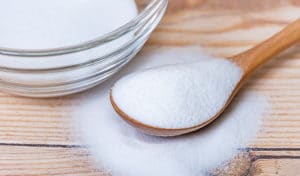 Citric Acid
Citric Acid
Citric acid is a common ingredient in many cleaners, especially for residential pressure washers. Just like vinegar, the acidity of this ingredient is enough to break down rust and stains from wood and concrete surfaces. When used with a pressure washer, citric acid is the most effective on wood decks, concrete driveways, and wood fences.
Oxalic Acid
Another acid on this pressure washing chemicals list is oxalic acid. This usually comes in powder form and is great for rust removal. It’s also very effective in removing scale and hard water stains from concrete surfaces, tile, and even grout.
Sodium Hypochlorite
Sodium hypochlorite is a great disinfectant. It’s often used to remove live, surface contaminants such as mold and algae. With such contaminants, it’s absolutely necessary to kill them from their origin and prevent them from growing again. As such, sodium hypochlorite comes in handy. Another use of sodium hypochlorite is to brighten surfaces.
Sodium Hydroxide
Otherwise known as caustic soda, sodium hydroxide is perfect for dissolving fats and grease. As such, many pressure washers use it to degrease surfaces made of steel and glass. This chemical is also readily available and quite affordable, making it popular among both professionals and DIY pressure washers.
Bleach
Bleach is a common household cleaner, so it doesn’t come as a surprise that many pressure washing cleaners also use it as an active ingredient. Consisting of sodium hydroxide and sodium hypochlorite, bleach is an effective sanitizer and disinfectant. Just don’t use bleach powder for your pressure washer or else it will come out with damage.
Ammonia
Typically used on glass and stainless steel surfaces, ammonia can actively break down stains and grime stemming from animal fats and vegetable oils. It also evaporates in rapid time, making it the preferred choice for cleaning glass surfaces as it prevents streaking.
Potassium Hydroxide
Potassium hydroxide is an ingredient in soft or liquid soap. Due to its versatility, you will find it in a lot of pressure washing cleaning products.
Soap vs. Corrosives vs. Detergent
You may encounter these three terms when shopping for a pressure washer fluid or when talking to a professional pressure washer. While you might think they’re interchangeable, pressure washer cleaning products like soaps, detergents, and corrosives are highly different.
Soaps
A pressure washing soap or power washer soap is specifically formulated to separate stains from surfaces. Thus, when you blast the surface with water after applying soap, the water removes the stain and other contaminants. The great thing about using soap for pressure washers is that you can apply it on low or high pressure.
Soap is very eco-friendly. It’s typically made with natural ingredients and is biodegradable. As such, you don’t have to worry about proper disposal. You can simply let the soap wash away and down the storm drains. Keep in mind, though, that you can’t use soap with untreated water. Those kinds of water have high levels of minerals in them, so they can leave hard water stains.
Detergents
A pressure washing detergent is specifically made to be a wood and concrete power wash cleaner. Detergents are often manufactured using man-made chemicals, though that doesn’t mean it’s not an effective cleaner. In fact, detergents can sometimes be more effective than soap in removing stains and dirt. And, unlike soap, you can use detergents with untreated water. This makes it a great power wash concrete cleaner and wood cleaner.
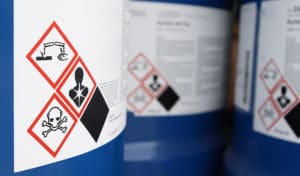 Corrosives
Corrosives
Corrosives are highly effective in dissolving grime. But, they can be harmful to your pressure washing machine. Therefore, it’s best to apply this pressure washing solution using a separate tool like a pump-up sprayer, an X-jet, or an airless foamer. After using a corrosive on a surface, blast away the remnants with hot water from a pressure washer.
How to Use Pressure Washer Chemicals
To incorporate pressure washing chemicals in your routine, make sure to follow the steps below:
- As usual, cover all furniture and plants to avoid spraying and damaging them.
- Fit your power washing machine with a low-pressure nozzle.
- Spray the chemical or cleaner using a bottom-to-top approach. This will prevent streaking later on.
- Allow the chemical solution to do its work for the amount of time instructed by the manufacturer. Otherwise, don’t leave it on for long.
- Spray the surface with water using the pressure washer. You can use a high-pressure nozzle for this step, depending on the surface material.
Professional vs. DIY Pressure Washing With Chemicals
Pressure washing is a professional’s game. While you can technically attempt to do it yourself, residential pressure washers don’t carry the same power as commercial-grade ones. Additionally, you might end up using the wrong kind of chemical cleaner.
Although it may not seem like it, hiring a professional is also more affordable in the long run. Not only do you save money on costly repairs from potential damages, but you also save money because professional companies buy products for cheaper. These companies usually buy concentrated chemicals in bulk and then mix their own solutions for optimal results.
If you’re worried about the impact of the cleaners on the environment, you can always ask your company to use only eco-friendly products and products that won’t harm animals.
The Best Solution
Pressure washing chemicals make for an easier pressure washing job. Nowadays, plenty of chemical cleaners are safe for the environment yet still achieve great results. Though, with the risks involved, it’s still best to contact a professional pressure washing company for help.
Washh offers pressure washing services to residential and commercial properties. We always use state-of-the-art technology and eco-friendly cleaning products. Call us today at 704.321.8000 or contact us online to learn more.
RELATED ARTICLES:
- Residential Pressure Washing: Benefits, Services, And Estimates
- Commercial Pressure Washer: How Does It Make A Difference?
- What’s The Cost To Pressure Wash A House?
